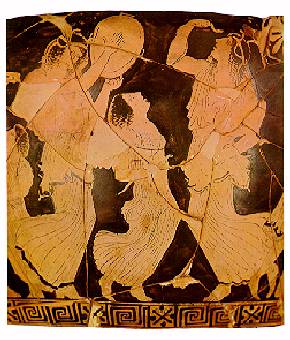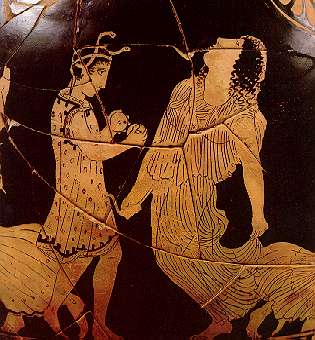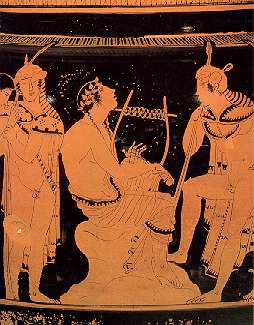 |
 |
3. Mythical sound events
In Greek mythology, there are some eighty such mythological characters connected with some kind of "mythical sound event" (Restani 1995). These events tend to gravitate around a few pivotal figures (like the Muses and Apollo) and the euretai, inventors of musical instruments: Athena (aulos), Hermes (lyra and syrinx), Pan (syrinx), Cybele (tympana), Tyrrhenian (salpinx). The events emphasize also two main themes. The first is the teaching, conservation, control and transmission of the mousike, prohibitions and transgressions included; the second concerns the effects of sound on the performer and the audience, like, for instance, oblivion (Sirens), delight and sorrow (Phoemius and Demodox), bewitchment (Orpheus), calm (Achilles), attraction (Amphion), trance (Dionysus).
 |
 |
The effects of Dionysus' music: Menads' dance. Ferrara, Museo archeologico nazionale, T. 128 V.T. (details).
In mythological accounts of sound events we can recognize a few main components that express the way in which the Greeks thought of mousike:
the teacher/pupil relationship (modeled on blood relationships);
the gift of knowledge and of an instrument (memory of cultural identity);
the agon or contest (ritual aggression and confrontation of memories);
discovery (rediscovered memory functional to the techne);
the "effect" (modification of the way of being).
The teacher/pupil relationship (Chiron/Achilles; Dactyls/Paris; Alpheus/Athena; Linus/Heracles; Eumolpus/Heracles; Pan/Daphnis) is modeled on the father/son or mother/son relationship (e.g. Apollo/Philammon; Muses/Orpheus, Ialemos, Hymenaeus; Muses/Sirens; Muses/Linus) and thus becomes a component of the genealogies of musicians. This central theme reflects the conviction that the mousike can be transmitted and that musical knowledge, later to become the responsibility of society as a whole, is the "possession" of the individuals who receive it through oral teaching and preserve it through memory.
This theme is based on the concept of memory as a gift, which is inherited and passed down along the branches of genealogies - starting from a Muse, the mother, and Apollo, the divine father - to the son or pupil, singer and link in the chain of knowledge; memory is a gift transmitted by the gods to men and shared for a few moments by both.
| The mythology of control and transmission of the
memory of sound is linked, on the one hand, to the duties
and responsibilities inherent in the
pedagogical-initiatory role; on the other hand, it
manifests the need to preserve the traditional habits and
values that are disseminated by means of the mousike,
such as the prohibition from taking possession of this
gift from the gods in violation of the rules of sharing. Leaving aside the example of the pedagogical-initiatory model evident in the figure and lineage of Orpheus (Restani 1994), whose features recall those of the "gifted bards who are found in tribal encampments, villages and towns from Central Asia to North Africa" (Shiloah 1997), our main focus here will be on the agonal-transgressive model represented by Marsyas and Thamyris, whose blood ties have been "reconstructed". The relationship of attraction-repulsion between Orpheus and Thamyris, that runs clearly running through both literary and figurative documents (Seebass 1991), seems to find its motivation in the opposite choices with regard to the use of memory. |
 Orpheus enchants the Thracians. Berlin, Antikenmuseum, 3172 (detail) |
Orpheus never wanted to take part in musical contests, that is, in those competitions whose result was in any case a foregone conclusion for the bard, triumphant among men but defeated by the gods (Paus. X.7.2-3). Instead, Homeric Thamyris took part in at least two such events, winning the first, in Delphi, and losing the second, perhaps at the Dotion plane. The challenge by the itinerant virtuoso to compete in the kitharodia is featured and reworked to the point of becoming a paradigm of reference, whose traces, present in Homer, actually constitute the virtuoso's own genealogy. Thus, in the Catalogue of ships under Nestor's command, we find a reference to Thamyris, accidentally born among the Odrysai in Trachis, who came from Oechalia from the house of Eurytus (Hom. Il. II.596). Subsequent mythological genealogies explain how his great-great-grandfather was Eurytus, father of Deione, who gave birth to Philonides, whose union with Apollo generated Philammon, father of the singer. The unfair challenge launched by Eurytus in the archery contest reminds us of Odysseus, who turned down the challenge of Phaeacians: it was well known that, once Melaneus had learned the technique of archery, this art became a motif of the most important events in his life, until he was punished with death by Apollo, whom he had dared to challenge with his bow (Hom. Od. VIII.228-229). The bow was replaced by the string instrument as the rules of competition were passed down through generations, first to Philammon, then to his son Thamyris, who also possessed the knowledge received from his mother, the nymph Argiope.
If, on the one hand, the musical event of the challenge appears to be based, as implied by Homer, on a competitive model inherited from Eurytus, on the other hand, it finds rich possibilities of development in the dense network of relationships between Nymphs and Muses and Muses and Sirens (already noted by Koller 1963) - a network which becomes even more convincing when seen from the viewpoint of the relationships between myth, mousike and memory. Not only is the competitive motif a constant feature in the ritual dances of the Nymphs devoted to Artemides, but it is also duplicated in the contest between Pierides and the Muses and even multiplied ad infinitum in the continuous challenges launched by the Sirens - sometimes described as the daughters of Terpsichore (Ap. Rh. IV.891-911) - against any mortal that sailed past Antemoessa, with the exception of Orpheus, a "brother" in sung and instrumental memory. Therefore, it is not by chance that in a further multiplying reflection, the Sirens become the enemies of the singer ("Thamyris in a fit of madness challenged the Sirens and the Muses"), while in another they share with him the immutable verdict of defeat (schol. in Aristoph., Dübner, p. 274). The parallel between the punishment of Eurytus by Apollo and of Thamyris by the Muses reveals how similar outcomes result from the almost symbiotic relationship between the bow and the string instrument. By virtue of this relationship, in Homer's poetic universe the archers and musical performers played similar roles within different social groups. Both had been recipients, through their genealogy and by divine will, of an object that was the depository of the magic sediment and possessed the knowledge of its use. As such, according to different customs and conventions, they cannot substitute the different indispensable forms of learning, transmission and reception of knowledge that are directed to preserve both the physical integrity and the cultural identity of the group. For if there is damage to even one of the delicate cogs regulating the balance between god and man - i.d., between innate, permanent knowledge, and given, temporal knowledge - then punishment is inevitable. In the case of Thamyris, punishment is more painful than death: by taking away his memory of song, divine gift, along with the technique of instrumental accompaniment, the Muses deprive him of the means by which one learns and transmits one's knowledge: (Hom. Il. II.599-600).